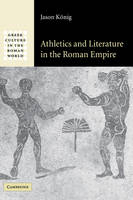
Athletics and Literature in the Roman Empire
Seiten
2005
Cambridge University Press (Verlag)
978-0-521-83845-0 (ISBN)
Cambridge University Press (Verlag)
978-0-521-83845-0 (ISBN)
Greek athletics flourished more in the Roman Empire than it ever had before. This book offers an exciting cultural history of the athletics of that period, setting out neglected evidence for athletic festivals and athletic education. It offers readings of a wide range of Greek and Latin authors.
From the first to third century AD Greek athletics flourished as never before. This book offers exciting readings of those developments. Drawing on a wide range of evidence, it sheds light on practices of athletic competition and athletic education in the Roman Empire. In addition it examines some of the ways in which athletic activity was represented within different texts and contexts. Most importantly, the book shows how discussion and representation of athletics could become entangled with many other areas of cultural debate, and used as a vehicle for many different varieties of authorial self-presentation and cultural self-scrutiny. It also argues for complex connections between different areas of athletic representation, particularly between literary and epigraphical texts. It offers re-interpretations of a number of major authors, especially Lucian, Dio Chrysostom, Pausanias, Silius Italicus, Galen and Philostratus.
From the first to third century AD Greek athletics flourished as never before. This book offers exciting readings of those developments. Drawing on a wide range of evidence, it sheds light on practices of athletic competition and athletic education in the Roman Empire. In addition it examines some of the ways in which athletic activity was represented within different texts and contexts. Most importantly, the book shows how discussion and representation of athletics could become entangled with many other areas of cultural debate, and used as a vehicle for many different varieties of authorial self-presentation and cultural self-scrutiny. It also argues for complex connections between different areas of athletic representation, particularly between literary and epigraphical texts. It offers re-interpretations of a number of major authors, especially Lucian, Dio Chrysostom, Pausanias, Silius Italicus, Galen and Philostratus.
Jason König is Lecturer in Greek and Classical Studies at the University of St. Andrews. He has written articles on a wide range of Greek authors from the Imperial period.
1. Introduction; 2. Lucian and Anacharsis: gymnasion education in the Greek city; 3. Models for virtue: Dio's Melankomas and the athletic body; 4. Pausanias and Olympic panhellenism; 5. Silius Italicus and the athletics of Rome; 6. Athletes and doctors: Galen's agonistic medicine; 7. Philostratus' Gymnasticus and the rhetoric of the athletic body; Conclusion.
| Erscheint lt. Verlag | 21.4.2005 |
|---|---|
| Reihe/Serie | Greek Culture in the Roman World |
| Zusatzinfo | 11 Halftones, unspecified; 1 Line drawings, unspecified |
| Verlagsort | Cambridge |
| Sprache | englisch |
| Maße | 152 x 229 mm |
| Gewicht | 790 g |
| Themenwelt | Sachbuch/Ratgeber ► Sport |
| Geschichte ► Teilgebiete der Geschichte ► Kulturgeschichte | |
| Geisteswissenschaften ► Sprach- / Literaturwissenschaft ► Anglistik / Amerikanistik | |
| Geisteswissenschaften ► Sprach- / Literaturwissenschaft ► Literaturwissenschaft | |
| Geisteswissenschaften ► Sprach- / Literaturwissenschaft ► Romanistik | |
| ISBN-10 | 0-521-83845-2 / 0521838452 |
| ISBN-13 | 978-0-521-83845-0 / 9780521838450 |
| Zustand | Neuware |
| Haben Sie eine Frage zum Produkt? |
Mehr entdecken
aus dem Bereich
aus dem Bereich
der stille Abschied vom bäuerlichen Leben in Deutschland
Buch | Hardcover (2023)
C.H.Beck (Verlag)
23,00 €
vom Mittelalter bis zur Gegenwart
Buch | Softcover (2024)
C.H.Beck (Verlag)
12,00 €


